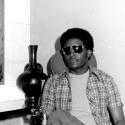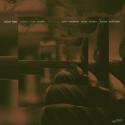Of all the major acts from the the acid house/rave explosion, Leeds's LFO seem least interested in becoming a “heritage act”. Perhaps it's because Mark Bell (the sole member of LFO since the early departure of Gez Varley) has no need to cash in on the brand, thanks to his lucrative “day job” as producer of choice for the likes of Björk and Depeche Mode.
Which isn't to say he's left LFO behind at any point; although it's almost ten years since his last album Sheath, he continues to periodically play live at clubs and festivals and by all accounts prolifically produces new tracks, but enabled by his production work just has no interest in hopping on board the promotional merry-go-round that a new album would entail.
![]() There is, however, a deluxe vinyl reissue of LFO's 1991 debut Frequencies imminent, so interest in this rare London show was certainly heightened. But true to form there was no sense that this was some kind of commemorative show (do people do 22nd anniversary shows?), nor any concession to the older audience who might have got babysitters in and made a special trip out: LFO's set began at 2am, and was part of a night packed to the gills with Friday night ravers and dedicated pretty much entirely to relentless techno.
There is, however, a deluxe vinyl reissue of LFO's 1991 debut Frequencies imminent, so interest in this rare London show was certainly heightened. But true to form there was no sense that this was some kind of commemorative show (do people do 22nd anniversary shows?), nor any concession to the older audience who might have got babysitters in and made a special trip out: LFO's set began at 2am, and was part of a night packed to the gills with Friday night ravers and dedicated pretty much entirely to relentless techno.
Slovenian ex-pat Maya Medvesek aka Nightwave (previously 8bitch) is one of the more interesting young producers on the scene with a particular ability to blend a lush expansive cosmic-oceanic aesthetic with a broad range of influences from uncompromisingly dancefloor-aimed rhythmic styles. As a DJ though, this breadth of influence can be problematic: on a good night she can make connections nobody else would, but sometimes the diversity is too much. This time she swayed towards the latter: perhaps in tribute to the veteran Bell she pulled out a barrage of early techno classics, but chopped and changed rhythm and style so she rarely hit a solid groove for long.
No such issue with Tom Russell aka Truss, whose grooves were nothing if not solid, and unstoppable. Unfortunately they erred too much in the other direction of predictability: based on the mid-90s sound of warehouse acid, they pounded, pummelled, broke down and built back up to roaring and gurgling synth overload, but never really innovated or took us anywhere we couldn't see coming 10 minutes away.
![]() We were, then a little weary, a little punch-drunk when Mark Bell took the stage (rather than the DJ booth where his precursors had been). A blast of pure white light into the crowd shocked us awake, but thankfully Bell's music, as well as dazzling visuals, kept us from slipping back into a torpid groove. From the very beginning, there was no question about whether he'd lost touch with his club roots: the sounds, the rhythms, the segues between sections could only have come from a man who's still in love with what a powerful soundsystem can do to moving bodies late at night.
We were, then a little weary, a little punch-drunk when Mark Bell took the stage (rather than the DJ booth where his precursors had been). A blast of pure white light into the crowd shocked us awake, but thankfully Bell's music, as well as dazzling visuals, kept us from slipping back into a torpid groove. From the very beginning, there was no question about whether he'd lost touch with his club roots: the sounds, the rhythms, the segues between sections could only have come from a man who's still in love with what a powerful soundsystem can do to moving bodies late at night.
Where Truss's sounds always harked back to a few strands of 1990s techno, Bell's spoke of the genre's whole history – taking in Detroit, Belgium, Germany, Holland and the British rave era which he himself helped to form. But as with every released LFO track, there was something new in every chord and lead line, even in every fresh kickdrum sound, however much they cleaved to the solid four-to-the-floor pattern: Bell has a unique gift in making machines sing, in making the sounds new and alive even as they may tap into the mainline of a tradition.
And this ability allowed him to weave instantly recognisable tracks from his repertoire into brand new riffs and rhythms without it seeming like he was either being drearily faithful to his history or trying to hard to rework it to be down with the kids. It was perfectly combined, too, with projected visuals that came on like Mondrian down a video arcade, constantly evolving new and giddy pattens from the simplest geometry and colour. All together it was a perfect demonstration of techno as a living force, and sore though our feet may have been by the end, well worth the wait.















Add comment